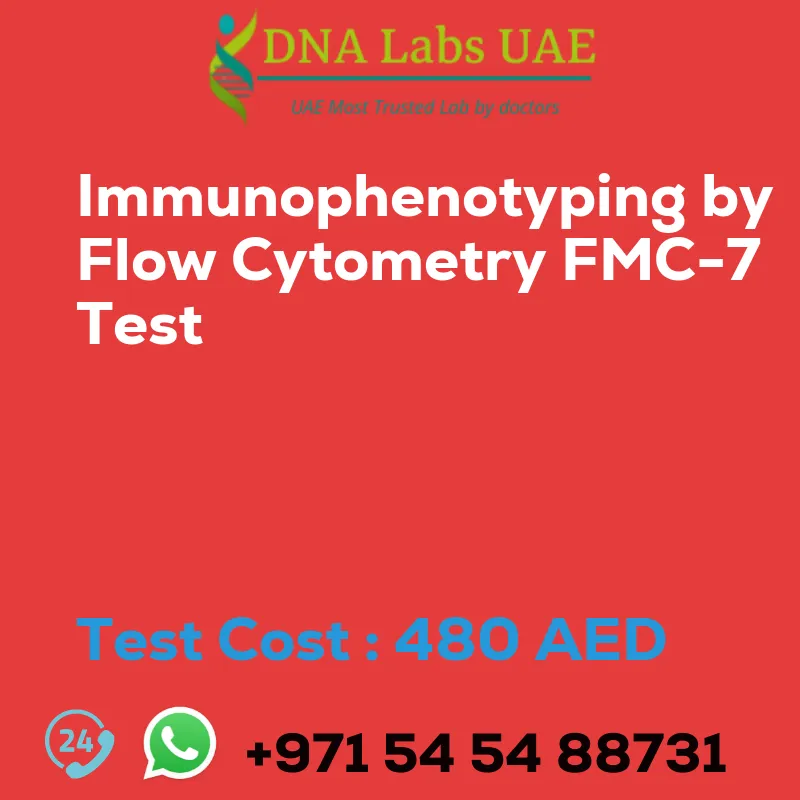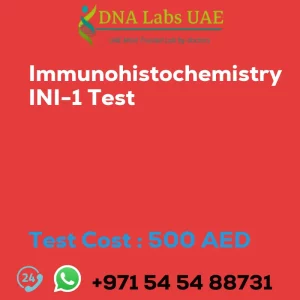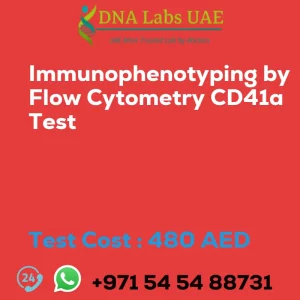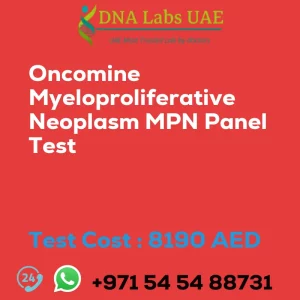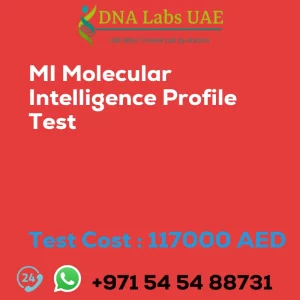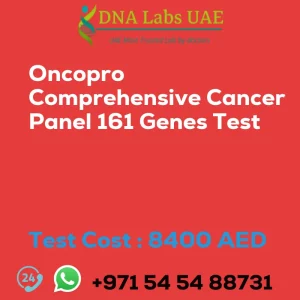IMMUNOPHENOTYPING BY FLOW CYTOMETRY FMC-7 Test
Test Cost: AED 480.0
Introduction
The FMC-7 test is a flow cytometry-based immunophenotyping assay used to identify and characterize lymphocytes in the blood or bone marrow. It specifically targets the FMC-7 antigen, which is expressed on the surface of B lymphocytes.
Test Components
- Price: 480.0 AED
- Sample Condition:
- 3 mL (2 mL min.) whole blood in 1 Lavender Top (EDTA) tube
- 3 mL (2 mL min.) whole blood in 1 Green Top (Sodium Heparin) tube OR 2 mL (1 mL min.) Bone marrow in 1 Green Top (Sodium heparin) tube
- Ship immediately at 18-22°C. DO NOT REFRIGERATE OR FREEZE.
- Specify time, date, and clinical details on the test request form.
Report Delivery
Sample: Daily by 9 am
Report: Same day
Method
Flow Cytometry
Test Type
Cancer
Doctor
Oncologist, Hematologist
Test Department
FLOW CYTOMETRY
Pre Test Information
Give brief clinical history.
Test Details
The FMC-7 test is a flow cytometry-based immunophenotyping assay used to identify and characterize lymphocytes in the blood or bone marrow. It specifically targets the FMC-7 antigen, which is expressed on the surface of B lymphocytes.
During the FMC-7 test, a blood or bone marrow sample is collected from the patient. The cells in the sample are then stained with specific fluorescent antibodies that target different markers on the surface of lymphocytes. One of the antibodies used in this assay is the FMC-7 antibody, which binds to the FMC-7 antigen on B lymphocytes.
After staining, the sample is run through a flow cytometer, which is a specialized instrument that measures the fluorescence emitted by each individual cell as it passes through a laser beam. The flow cytometer analyzes the fluorescence intensity of the stained cells and categorizes them based on their expression of different markers.
In the case of the FMC-7 test, the flow cytometer identifies and quantifies the percentage of B lymphocytes that express the FMC-7 antigen. This information can be useful in the diagnosis and monitoring of certain lymphoproliferative disorders, such as chronic lymphocytic leukemia (CLL).
In CLL, the FMC-7 antigen is typically absent or expressed at low levels on the surface of B lymphocytes, which can help differentiate CLL from other lymphoid malignancies.
Overall, the FMC-7 test provides valuable information about the immunophenotype of lymphocytes and can aid in the diagnosis and management of various hematological disorders.
| Test Name | IMMUNOPHENOTYPING BY FLOW CYTOMETRY FMC-7 Test |
|---|---|
| Components | |
| Price | 480.0 AED |
| Sample Condition | 3 mL (2 mL min.) whole blood in 1 Lavender Top (EDTA) tubeAND 3 mL (2 mL min.) whole blood in 1 Green Top (Sodium Heparin) tube OR 2 mL (1 mL min.) Bone marrow in 1 Green Top (Sodium heparin) tube. Ship immediately at 18\u0192??22?\u00f8C. DO NOT REFRIGERATE OR FREEZE. Specify time, date and clinical details on test request form. |
| Report Delivery | Sample Daily by 9 am;Report Same day |
| Method | Flow Cytometry |
| Test type | Cancer |
| Doctor | Oncologist, Hematologist |
| Test Department: | FLOW CYTOMETRY |
| Pre Test Information | Give brief clinical history. |
| Test Details |
The FMC-7 test is a flow cytometry-based immunophenotyping assay used to identify and characterize lymphocytes in the blood or bone marrow. It specifically targets the FMC-7 antigen, which is expressed on the surface of B lymphocytes. During the FMC-7 test, a blood or bone marrow sample is collected from the patient. The cells in the sample are then stained with specific fluorescent antibodies that target different markers on the surface of lymphocytes. One of the antibodies used in this assay is the FMC-7 antibody, which binds to the FMC-7 antigen on B lymphocytes. After staining, the sample is run through a flow cytometer, which is a specialized instrument that measures the fluorescence emitted by each individual cell as it passes through a laser beam. The flow cytometer analyzes the fluorescence intensity of the stained cells and categorizes them based on their expression of different markers. In the case of the FMC-7 test, the flow cytometer identifies and quantifies the percentage of B lymphocytes that express the FMC-7 antigen. This information can be useful in the diagnosis and monitoring of certain lymphoproliferative disorders, such as chronic lymphocytic leukemia (CLL). In CLL, the FMC-7 antigen is typically absent or expressed at low levels on the surface of B lymphocytes, which can help differentiate CLL from other lymphoid malignancies. Overall, the FMC-7 test provides valuable information about the immunophenotype of lymphocytes and can aid in the diagnosis and management of various hematological disorders. |

